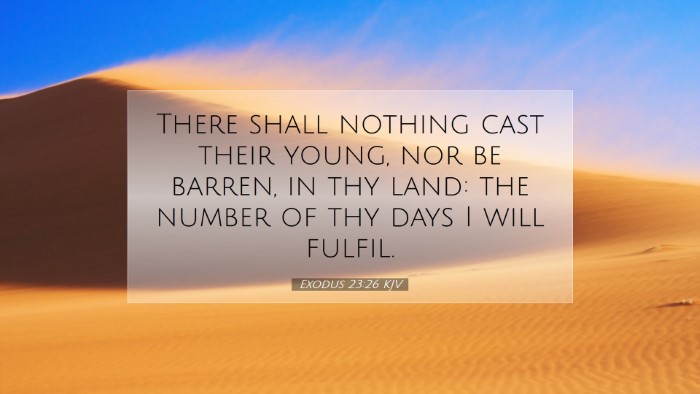Exodus 23:26 Commentary
Bible Verse: "There shall nothing cast their young, nor be barren, in thy land: the number of thy days I will fulfill." (Exodus 23:26, KJV)
Introduction
The verse Exodus 23:26 stands at the intersection of divine promise and covenant relationship. It serves as a reassurance from God to His people regarding fertility, health, and longevity within the Promised Land. For pastors, theologians, and students of Scripture, the significance of this verse transcends just physical blessings; it speaks to the holistic well-being that God desires for His people.
Contextual Analysis
Exodus 23 is part of the broader covenant code outlining the laws and ordinances that God expected Israel to follow. The surrounding verses emphasize justice, mercy, and communal responsibility. This context establishes the framework within which God's promise in verse 26 can be understood—not merely as individual blessings but as a collective assurance for the entire nation.
Matthew Henry's Insight
Matthew Henry highlights that this verse signifies God's care for His people, linking it to the previous injunctions regarding their conduct. Henry emphasizes that blessings both physical and spiritual are contingent upon obedience. Therefore, the phrase "There shall nothing cast their young" suggests that God will ensure the prosperity and increase of His people, aligning with His covenant faithfulness.
Albert Barnes' Perspective
Albert Barnes focuses on the implications of barrenness and the significance of fruitfulness in ancient Israelite culture. He interprets this promise as a reflection of God’s covenantal loyalty and His desire for His covenant people to thrive. Barnes notes that the reference to barrenness implies not only the fertility of livestock but also the well-being of families, which culturally represented God's blessing. Furthermore, he concludes that the promise of long life—"the number of thy days I will fulfill"—implies purposeful existence, suggesting that God has sovereign control over life and death.
Adam Clarke's Commentary
Adam Clarke draws attention to the metaphoric implications of the verse. He notes that "casting young" may symbolize spiritual barrenness or failure to produce fruits of righteousness. Clarke indicates the parallel between physical health and spiritual vitality, suggesting that the barrenness mentioned could extend beyond mere agriculture and livestock. The fulfillment of days, according to Clarke, is also an affirmation of divine providence, wherein God secures not just quantity of years but also quality of life filled with spiritual significance.
Theological Implications
This verse holds profound theological implications, revealing key aspects of God’s nature.
- Covenantal Faithfulness: The assurance of fertility and longevity is rooted in God’s unwavering fidelity to His covenant people.
- Impact of Obedience: It underscores the principle that obedience to God's commands leads to divine blessings, establishing a relational dynamic between God and His people.
- Holistic Well-being: The verse exhibits God's concern for every dimension of human existence—physical, social, and spiritual.
Practical Applications
For pastors and leaders, this verse offers valuable insights in guiding congregations toward obedience and trust in God’s promises. Here are a few practical applications:
- Encouragement in Trials: Remind congregations that God is committed to their well-being, even amidst life’s challenges and barrenness.
- Promoting Spiritual Health: Foster an environment that encourages spiritual fruitfulness through discipleship and community engagement.
- Celebration of Divine Blessings: Encourage recognition and gratitude for God’s blessings—both physical and spiritual—enhancing corporate worship experiences.
Conclusion
Exodus 23:26 serves as a robust reminder of God’s promises to His people concerning their prosperity and well-being. By combining insights from traditional commentaries, we see that this verse is a call towards maintaining faithfulness in our relationship with God. The blessings of fertility and longevity are not solely for individual enjoyment but for the fulfillment of divine purposes within the covenant community. As believers today, reflecting on this promise invites us to embrace a life that seeks to honor God’s commands, confident in the assurance that He desires our holistic flourishing.


